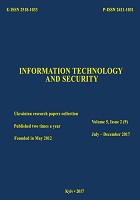Negative information-psychological impact on individual consciousness based on socio-engineering approach
DOI:
https://doi.org/10.20535/2411-1031.2017.5.2.136929Keywords:
Індивідуальна свідомість, негативний інформаційно-психологічний вплив, соціоінженерний підхід, соціальна інженерія, інформаційно-психологічна безпека.Abstract
The information-psychological impact on individual consciousness is considered. It is established that such influence has not only constructive, positive character, but also destructive, negative in relation to the personality. Internal and environmental factors lead to this. Individual-psychological properties of the individual affect her actions, acts, behavior in the process of life. Therefore, it not the only successful implementation of negative information and psychological impact depends on them but also opposition to it. The research directions of ways overcoming this problem were analyzed. Among them allocated, the implementation of negative information-psychological impact based on the socio-engineering approach. This choice is caused to the fact that the result of the psychological interaction of interpersonal communication is shown in the change emotional state, behavior or internal attitudes at least by the one interacting side to achieve the stated goal, namely unauthorized access to information. Social engineering methods are aimed for such a change in the psyche at which the objective reality changes, the conditions of activity. Such a change achieved due to the negative information-psychological impact on the individual consciousness through the impact on the person’s mental state, feelings, thoughts and actions with exclusively psychological means. The features of such influences are that the person can ignore it and not realize it as the threat. This caused by the fact that it didn’t always realize, leads to the creation of illusions concerning reality, programming of motives to cooperation, the hidden management. Given this, the ways of ensuring the individual security consciousness from the negative information-psychological impact based on socio-engineering approach are proposed.
References
V.L. Buriachok, S.V. Toliupa, V.V. Semko, L.V. Buriachok, P.M. Skladannyi, and N.V. Lukova-Chuiko, Information and cyberspace: security problems, methods and means of struggle. Kyiv, Ukraine: DUT - KNU, 2016.
Ministry of Information Policy of Ukraine. (2015, Jun. 5). Draft Concept of Information Security of Ukraine. [Online]. Available: http://mip.gov.ua/done_img/d/30-project_08_06_ 15.pdf. Accessed on: Aug. 07, 2017.
V.L. Buriachok, R.V. Hryshchuk, and V.O. Khoroshko, Information security policy, Kyiv, Ukraine: PVP “Zadruha”, 2015.
T.B. Hrytsenko, Ethics of business communication. Kyiv, Ukraine: Center of educational literature, 2007.
R.V. Hryshchuk, and Y.H. Danyk, Fundamentals of cyber security. Zhytomyr, Ukraine:
ZHNAEU, 2016.
V.A. Lipkan, “The essence of hybrid war against Ukraine”, Imperatives of the development of civilization, no. 2, pp. 13-16, 2015.
Y.M. Zharkov, V.M. Petryk, M.M. Prysiazhniuk, Y.D. Skulysh, and L.F. Kompantseva, Information-psychological confrontation (evolution and modernity). Kyiv, Ukraine: Vipol, 2013.
V.M. Shlapachenko, “Misinformation as a means of information-psychological influence”, Information security of the Person, Society and State, no. 2 (12), pp. 79-86, 2013.
K.Y. Khvorost, Psychological principles of the informational position of the individual. Lutsk, Ukraine: Vezha-Druk, 2016.
P.S. Atamanchuk, V.V. Menderetskyi, O.P. Panchuk, and O.H. Chorna, Life Safety. Kyiv, Ukraine: Center of educational literature, 2011.
Z. Virna, and K. Khvorost, Psychology of professional safety, technology constructive self identity. Lutsk, Ukraine: Vezha-Druk, 2015.
G.V. Grachev, and I.K. Melnik, Manipulation by personality: the organization, methods and technologies of information-psychological impact. Moskow, Russia: Algorithm, 2002.
E.L. Dotsenko, Psychology of manipulation: phenomena, mechanisms and protection. Moskow, Russia: MSU Publishing House, 1997.
Yu. Polishchuk, S. Gnatyuk, N. Seilova, “Mass media as a channel of manipulative influence on society”, Bezpeka ìnformacìì, vol. 21, no. 3, pp. 301-308, 2015.
doi: 10.18372/2225-5036.21.9709.
B.V. Ostroukhov, B.M. Petryk, and M.M. Prysiazhniuk, Information security (socio-legal aspects). Kyiv, Ukraine: KNT, 2010.
O.V. Tsurkan, V.V. Mokhor, and R.P. Herasymov, “ Manipulative form of socioengineering impact on personality in cyberspace ”, in Proc. Ukrainian scientific and practical conference. Actual problems of information security management of the state, Kyiv, 2015, pp. 303-304.
T.K. Chmut, H.L. Chaika, M.P. Lukashevych, and I.B. Osechynska, Ethics of business communication. Kyiv, Ukraine: MAUP, 2003.
Downloads
Published
How to Cite
Issue
Section
License
Copyright (c) 2020 Collection "Information technology and security"

This work is licensed under a Creative Commons Attribution 4.0 International License.
The authors that are published in this collection, agree to the following terms:
- The authors reserve the right to authorship of their work and pass the collection right of first publication this work is licensed under the Creative Commons Attribution License, which allows others to freely distribute the published work with the obligatory reference to the authors of the original work and the first publication of the work in this collection.
- The authors have the right to conclude an agreement on exclusive distribution of the work in the form in which it was published this anthology (for example, to place the work in a digital repository institution or to publish in the structure of the monograph), provided that references to the first publication of the work in this collection.
- Policy of the journal allows and encourages the placement of authors on the Internet (for example, in storage facilities or on personal web sites) the manuscript of the work, prior to the submission of the manuscript to the editor, and during its editorial processing, as it contributes to productive scientific discussion and positive effect on the efficiency and dynamics of citations of published work (see The Effect of Open Access).

